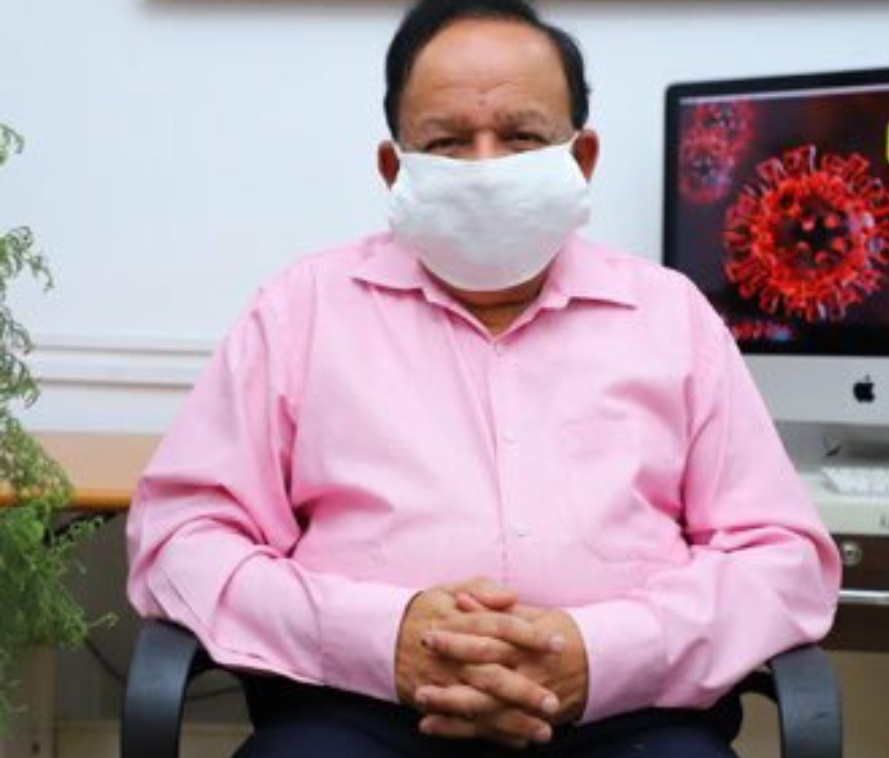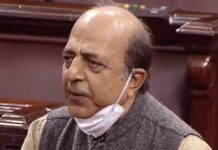 Forge cooperation and mutually respectful and useful collaborations to deal with COVID-19 disease, stressed Dr. Harsh Vardhan on Sunday during the Video Conference of the Health Ministers of G20 countries, an international forum for the governments of 19 countries and the European Union (EU). The 19-member countries of G20 are Argentina, Australia, Brazil, Canada, China, Germany, France, Indonesia, Italy, Japan, Mexico, the Russian Federation, Saudi Arabia, South Africa, South Korea, Turkey, United Kingdom, United States of America and India.
Forge cooperation and mutually respectful and useful collaborations to deal with COVID-19 disease, stressed Dr. Harsh Vardhan on Sunday during the Video Conference of the Health Ministers of G20 countries, an international forum for the governments of 19 countries and the European Union (EU). The 19-member countries of G20 are Argentina, Australia, Brazil, Canada, China, Germany, France, Indonesia, Italy, Japan, Mexico, the Russian Federation, Saudi Arabia, South Africa, South Korea, Turkey, United Kingdom, United States of America and India.
“I congratulate you all for managing and keeping the situation under control in our fight against COVID-19 in your respective Countries”, said Dr. Harsh Vardhan during the meeting. He said the “Global health crisis witnessed by the world today, creates an opportunity to dive deep into the nature of what connects us all, while at the same time providing us with the collective strength and wisdom to accomplish.” Mentioning about successful collective global efforts in the past, he said, “In the past, we as a global community have faced and successfully tackled threats to health of our people, by a collective sense of purpose, support and collaborating with each other. I look forward to similar cooperation and mutually respectful & useful collaborations to deal with Coronavirus Disease (COVID-19).While some of the countries particularly Japan, Singapore, South Korea have fared well, others are still struggling with COVID-19. The scale of impact is unprecedented and therefore calls for cooperation between nations to attain normalcy.”
Talking about the present scenario of COVID in the country, he said, “As of today, the 19thof April, we have completed 25 days of lockdown which will further extend till the 3rdof May. The results of the same were realized when our case doubling rate which was about 3.4 days on the 17thof March, dropped to 4.4 days by the 25thof March, and is currently about 7.2 days.”
Highlighting India’s approach in combating COVID-19, he said, “This time the hallmark of our approach has been fivefold: (i) Maintaining a continuous situation awareness, (ii) Pre-emptive and proactive approach, (iii) Graded response as per continuously evolving scenario, (iv) Inter-sectoral coordination at all levels, and lastly, but most importantly (v) Creating a people’s movement to combat this disease.”
Talking about India’s strategic response to the disease, he said “Much before the outbreak was declared a Public Health Emergency of International Concern by the World Health Organization, India was much ahead in implementing actions targeting core capacities as mandated under the International Health Regulations (IHR).” “Our efforts have been pre-emptive and proactive. We started surveillance of flights from COVID affected countries twelve days before we even had the first case in India on the 30thof January, 2020. By 22ndof March, 2020 with less than 400 cases, we had banned all international flights to and from India, and by 25thof March, 2020 we had implemented a nationwide lockdown.”
Commenting on India’s strengths in tackling the disease, he said, “India has successfully tackled public health emergencies of international concern and pandemics in the past as well.” He also added, “Our nation has the requisite national core capacities stipulated in the International Health Regulations to manage public health emergencies. The Integrated Disease Surveillance Programme (IDSP), which is a nation-wide surveillance system for epidemic prone diseases has been activated towards COVID response, and is being further strengthened with substantive digital inputs.”
Elucidating the strategy further, he said, “India has made the conscious decision to focus on building exclusive infrastructure for management of COVID patients so that there is no intermingling of COVID patients. All the people who are tested positive are treated in one of three types of dedicated COVID management Centres: COVID Care Centres(CCCs) for mild symptomatic cases, COVID Health Centres(CHCs) for moderate cases and COVID Hospitals (CHs) for severe cases. These dedicated COVID facilities are mapped to each other in the design of a referral network architecture for dynamic movement of patients as symptoms evolve, so that optimal clinical care can be provided timely, commensurate to symptoms.”
Talking about specific disease prevention and containment measures, he said “In the absence of any specific drug or vaccine, India relied on various non-pharmacological interventions. Particular focus was on measures like social distancing and risk communication to the masses on simple public health interventions like hand hygiene and respiratory etiquettes.” On the topic of development of vaccine for COVID-19, he said, “While the traditional ways and means to tackle the disease were being implemented, our scientists and doctors are exploring new and innovative measures to maximize our reach. Cutting edge technology is being used to not only maintain inventory and patient level information, direct to citizen mobile applications are being used for communicating geospatial risk and best practices to be followed.”
Stressing on the traditional Indian doctrine of “Vasudhaiv Kutumbakam” – The world is one family, he said, “Since the onset of this pandemic, India has taken leadership and assisted neighbouring countries in multitude of ways. During medical evacuation undertaken by India from Wuhan, China as well as from COVID-19 affected Diamond Princess Cruise ship, we evacuated foreign nationals from Maldives, Bangladesh, Myanmar, South Africa, USA, Madagascar, Sri Lanka, Nepal, South Africa and Peru.” Moreover, “India as a global leader in pharmaceuticals, has stepped to make sure supplies of drugs like Hydroxychloroquine are made available to countries around the world. India is working with global partners to ensure that effective drugs and vaccines can be developed, and made available to all of us as soon as possible.”, he said.
At the end while thanking the chair Dr. Harsh Vardhan reiterated India’s support to the global health agenda, and said, “India looks forward towards working with G20 member countries to pursue unified efforts towards mitigation of COVID-19.”











